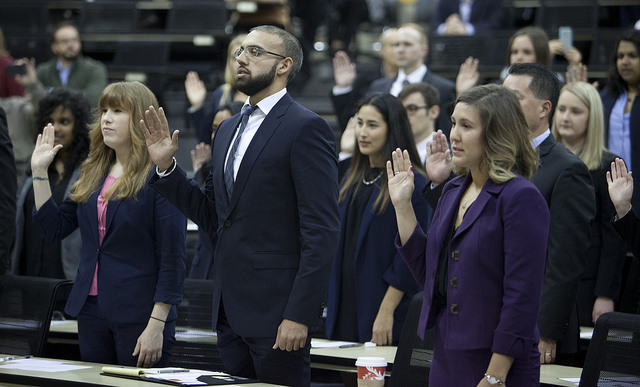In Keller v. State Bar of California, 496 U.S. 1 (1990), members of the California state bar challenged the bar’s use of compulsory membership fees to support political causes with which members disagreed. They claimed such a practice was a violation of the members’ right to free association. Chief Justice William H. Rehnquist, delivering the opinion for a unanimous Supreme Court, held that the state bar could fund such political causes if they were “germane” to the association.
Court held that state bar could use dues for “germane” causes
Despite the state bar’s assertion and the California Supreme Court’s finding to the contrary, the U.S. Supreme Court held that for purposes of the First Amendment the state bar was not a state agency entitled to protection under the “government speech doctrine.” It more closely resembled a labor union, and the Court proceeded to analyze the case from that perspective. Relying on an earlier opinion dealing with the spending of union dues, Abood v. Detroit Board of Education (1977), the Court held that the state bar could use the dues of dissenting members to fund political and ideological activities “germane” to the purpose justifying the compelled association. It then fell to the Court to provide a definition of “germane” activities.
Court framed test for determining “germane” activities
The Court turned to Ellis v. Brotherhood of Railway, Airline and Steamship Clerks (1984) to frame the proper test. It held that “the guiding standard must be whether the challenged expenditures are necessarily or reasonably incurred for the purpose of regulating” the legal profession or improving the quality of legal services in the state. The Court acknowledged that drawing a precise line between acceptable and unacceptable activities would not always be easy. But it found the extreme ends of the spectrum to be clear.
Bar had to adopt a fee challenge procedure
Finally, the Court called on the State Bar of California to adopt a challenge procedure to its fee scheme in line with the Court’s earlier decision in Chicago Teachers Union v. Hudson (1986). That decision outlined a three-part procedure:
- (1) a fee must be accompanied by an adequate explanation of the basis of the fee;
- (2) a member must have a reasonably prompt opportunity to challenge the amount of the fee before an impartial decision maker; and
- (3) an escrow account should be established for the amounts reasonably in dispute while challenges are pending.
Alan Tauber is a constitutional law attorney in Washington. In addition to a law degree from George Washington University School of Law, Tauber has a master’s degree in political science. This article was originally published in 2009.

